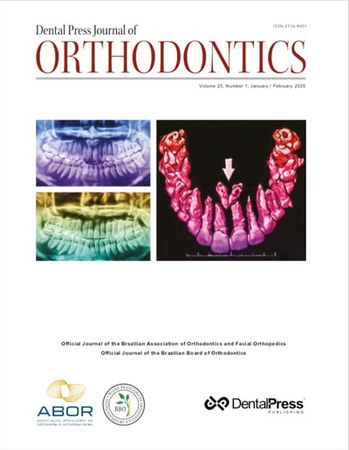
Seu carrinho está vazio!
Objective: This study proposed to investigate the influence of catastrophizing and others factors related to pain during orthodontic treatment. Methods: 27 patients with 0.022 x 0.028-in Straight-wire brackets were evaluated during alignment and leveling phase with nickel-titanium wires. Visual Analog Scales measured the intensity of orthodontic pain at six moments after a clinical appointment: 6 first hours; 1, 2, 3, 5, and 7 days. Multiple linear regression and stepwise approach assessed...



During my orthodontic training, in the early 90’s, the lower arch dimensions were inviolable. On the other hand, expansions of the upper arch were obtained, in children, by palatal expansions, while in adults they were carried out by means of surgically-assisted expansion. However, not always the face and the malocclusion have the same needs. It isn’t rare to be in doubt on when to align teeth in patients with concave profiles, that would not benefit from tooth extractions. On the...

Unlike other areas of dentistry, the prediction of treatment time in orthodontics involves many variables, such as degree of complexity, systemic aspects and collaboration, some of which can accelerate or delay treatment time. Knowledge about all the factors that can affect treatment time is essential for better case planning. Recently, a group of British researchers1 published a study that evaluated whether or not socioeconomic and/or psychosocial factors could alter the duration of...

The atrophy of the periodontal ligament places the tooth very close to the bone or another tooth, as occurs in unerupted teeth. The absent interdental bone and the lack of functional periodontal stimulus may lead to the fusion of the appositional layers of cement between the roots of the teeth. Concrescence almost always occurs in the region of the maxillary molars. Asymptomatic, it should always be remembered when the proper response to orthodontic movement is not obtained, and there is no...

Objective: To qualitatively and quantitatively assess the color changes effect and the color stability of the resin infiltrant on white spot lesions (WSLs), in comparison with nano-hydroxyapatite (nano-HA) toothpaste and microabrasion. Methods: WSLs were artificially created on sixty human premolars enamel surfaces and randomly assigned to equal four groups (n = 15 each): nano-HA toothpaste, microabrasion (Opalusture), resin infiltrant (Icon) treatment, or artificial saliva (control group)....

Objective: The purpose of this study was to evaluate the effect of the Yd:YAG laser irradiation on orthodontic bracket base surface. Shear bond strength (SBS) values and sites of the bonding failure interfaces were quantified. Methods: Brackets were divided into two groups: OP (One Piece - integral sandblast base) and OPL (One Piece - laser irradiation). The brackets were randomly bonded on an intact enamel surface of 40 bovine incisors. The SBS tests were carry out using a universal test...

Introduction: Tooth agenesis is one of the most common dental anomalies; however, the concomitant occurrence of opposite dental numerical variation of hypohyperdontia is extremely rare. Objective: To report the successful orthodontic management of a patient with non-syndromic concomitant bilateral agenesis of mandibular canines and two midline inverted supernumerary maxillary teeth. Case report: 21-year-old female patient with a chief complaint of protrusive right maxillary central incisor....

Introduction: Several advantages have been established regarding the efficiency of self-ligating brackets (SL). In spite of some controversy surrounding this question in the literature, clinical results confirm that “arch development” requires fewer extractions. Objective: The objective of this study was to compare changes in the transverse and sagittal planes in patients treated with conventional ligating brackets (CL)as well as in patients treated with SL brackets and oversized arches....

Objective: The objective of this study was to determine orthodontists’, periodontists’, and laypersons’ perception of smile esthetics, regarding the presence of different levels of gingival recession on the maxillary left canine. Material and Methods: Two close-up smile images (frontal and oblique) of a white female were selected for this study. The images were digitally altered to create different levels of gingival recession on maxillary left canine, in 0.5-mm increments. They were...

Transverse deficiencies should be a priority in orthodontic treatment, and should be corrected as soon as diagnosed, to restore the correct transverse relationship between maxilla and mandible and, consequently, normal maxillary growth. Corrections may be performed at the skeletal level, by opening the midpalatal suture, or by dentoalveolar expansion. The choice of a treatment alternative depends on certain factors, such as age, sex, degree of maxillary hypoplasia and maturation of the...

Introduction: The aesthetic analysis of a smile may be facilitated by the use of a template that provides several dental aesthetic references and support for the diagnosis, simplifying it and defining guidelines for the aesthetic planning of orthodontic and integrated treatments. Objective: To describe a simple and objective procedure for the evaluation of smile aesthetics using the SmileCurves digital template (SCT), based on the superimposition of intraoral photographic images and close-up...

Copyright © 1998 - 2022 DentalGO | Todos Direitos Reservados. DentalGO é uma marca Dental Press